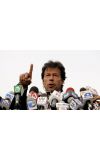
19 Mar 2012 13:50:41
Imran Khan, the Pakistani cricketer-turned-politician, has pulled out of a conference in Delhi because of the expected attendance of Salman Rushdie.
An aide to Khan told the Guardian the 59-year-old, who leads a conservative political party currently riding a wave of mass support in his home country, learned of Rushdie's invitation to the India Today Conclave only on Tuesday evening, and made an immediate decision.
Shireen Mazari, who advises Khan on foreign affairs, said: "He categorically rejected participating in any programme that included Salman Rushdie, who has caused immeasurable hurt to Muslims across the globe."
In January, Rushdie was forced to pull out of the Jaipur literary festival, the biggest such event in south Asia, after protests by Indian Muslim groups, which consider his 1988 novel The Satanic Verses blasphemous.
The writer, who has Indian origins, is due to speak on Friday in Delhi at the conference, hosted by the India Today media group, in a talk called The Liberty Verses. Other speakers include Henry Kissinger, Bollywood stars, Indian ministers and Vince Cable, the British secretary of state for business.
Khan was to have given a keynote speech at a gala dinner to close the conference on Saturday night, focusing on his experiences as an international cricketer and on lessons for leaders from sport.
The United Kingdom is one of the sponsors of the conference, having paid tens of thousands of pounds to become its first "country partner". Guests will be served a "taste of Britain" menu at dinner, created by the British chef Rob Rees, and cream teas during the day.
Rushdie's session will be moderated by Aatish Taseer, the son of Salman Taseer, a governor of Pakistan's Punjab who was shot dead by one of his own bodyguards for opposing the country's strict Islamic blasphemy laws.
Khan, the former husband of Jemima Khan, has long followed a conservative agenda, and members of his party have recently shared platforms with hardline religious groups at mass meetings in Pakistan.
His calls for a radical review of Pakistan's relationship with the US, and criticism of western cultural influences in his native land, have tapped a rich vein of support in a nation where many see the west as pursuing a belligerent campaign against the Islamic world.

